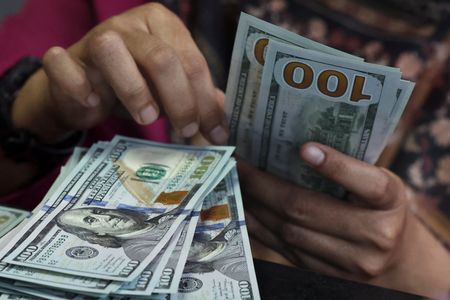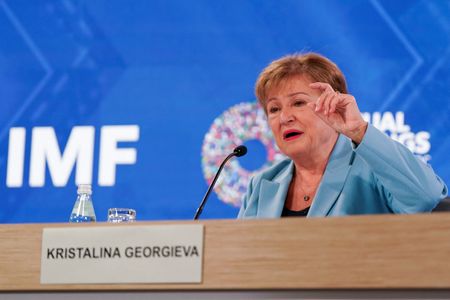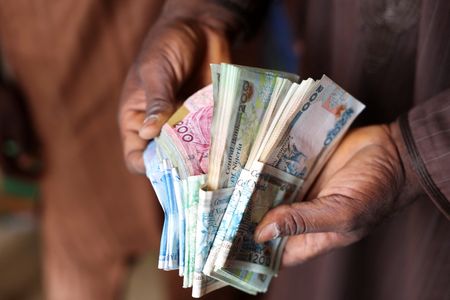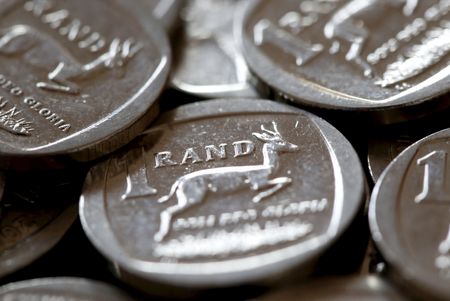By Stefano Rebaudo
(Reuters) -The U.S. dollar headed for a third straight daily loss against the euro while edging up versus the yen on Thursday, as concerns over U.S.-China tensions and dovish remarks from Federal Reserve officials continued to weigh on sentiment.
Analysts say political headwinds have weighed on the yen but expect support to come from looming Fed rate cuts, the end of U.S. quantitative tightening, and a potential rise in market volatility, which usually supports safe-haven assets.
The Fed’s Beige Book released on Thursday offered little support to U.S. rates, pointing to emerging signs of economic weakness, including rising layoffs and reduced spending among middle and lower-income households. Fed Governor Stephen Miran said on Wednesday cutting rates was now more important.
The dollar index, which measures the greenback against six other currencies, was down 0.05% at 98.64, and was on track for a weekly decline of around 0.3%.
U.S. Treasury yields hovered near multi-week lows, with the benchmark 10-year just above 4%, pressuring the dollar as investors also weighed a prolonged U.S. government shutdown. However, analysts are cautious about forecasting a further drop in U.S. rates.
“As the 10-year (U.S. Treasury) closed in on 4%, we took profit and returned to a neutral stance,” said Nicolas Jullien, global head of fixed income at Candriam.
“We are now close to turning positive again and looking to enter long positions on any weakness,” he added.
RARE EARTHS IN FOCUS
Investors were scrutinising China’s latest expansion of rare earth export controls, a move sharply criticised by senior U.S. officials on Wednesday, who warned that it could disrupt global supply chains.
“The question for financial markets is whether China’s proposed export controls on rare earths are merely part of a bargaining ploy to achieve greater concessions from the U.S.,” said Chris Turner, global head of markets at ING.
Amid the tit-for-tat action, U.S. President Donald Trump still expects to meet Chinese President Xi Jinping in South Korea this month, U.S. Treasury Secretary Scott Bessent said.
“Escalation of tensions in Sino-U.S. trade relations is generating a reaction amongst European governments, underscoring the impact on the global supply chain of recent developments, which can have a potential knock-on effect on European output,” said Geoff Yu, macro strategist at BNY.
FRENCH POLITICAL DRAMA IN BACKGROUND
The euro touched a one-week high and was up 0.09% at $1.1651 after French Prime Minister Sebastien Lecornu survived the first of two no-confidence votes in parliament.
France’s political crisis has barely affected euro zone sovereign bond markets as investors see no room for a selloff in French bonds without snap elections.
However, by shelving pension reform until after 2027, France’s prime minister has defused a sharp escalation in the crisis, though at the cost of complicating efforts to rein in public finances, analysts said.
The yen briefly firmed to a one-week high of 150.51 per dollar but was up 0.10% at 151.22. Japan’s weakened Liberal Democratic Party is set to begin policy talks with the right-leaning Innovation Party on Thursday that could help Sanae Takaichi clinch a prime ministerial vote expected next week.
“Regardless of the outcome of the prime ministerial election, it is highly likely that the market will price in some expansionary fiscal policies,” said Shinichiro Kadota, head of Japan forex and rates strategy at Barclays Tokyo.
“We remain long on the U.S. dollar versus the yen given the risk of a further rally but with eyes on an eventual intervention risk or Bank of Japan hike if the move extends.”
The Australian dollar was roughly unchanged at $0.6506 after data showed unemployment hit a near four-year high in September, adding to the case for interest rate cuts. [AUD/]
The Aussie, often considered a proxy for risk appetite, remains hostage to China-related news and its good fundamentals could crumble in a major trade war.
China’s yuan firmed to a two-week high against the U.S. dollar on Thursday after the central bank set its strongest daily midpoint in a year. [CNY/]
(Reporting by Stefano Rebaudo; Editing by Lincoln Feast, Mark Heinrich and Ed Osmond)









